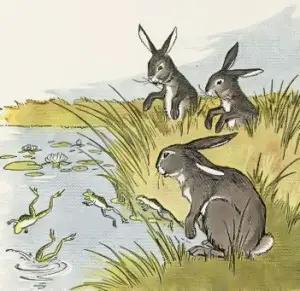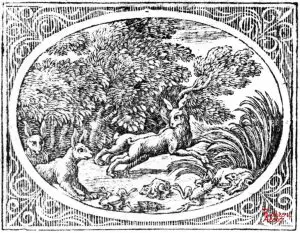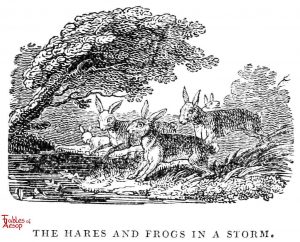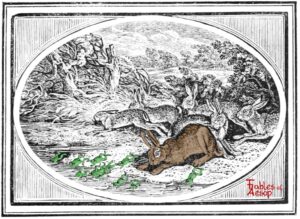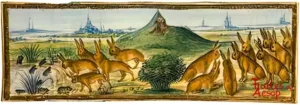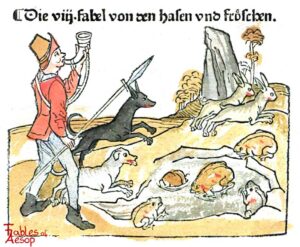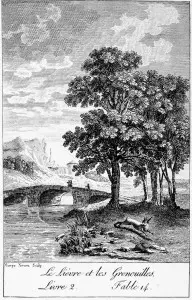Hares were tired of being afraid. They went to drown themselves when they scared some frogs. Fear no more.
There is always someone worse off than yourself.

Eliot/Jacobs Version
The Hares were so persecuted by the other beasts, they did not know where to go. As soon as they saw a single animal approach them, off they used to run. One day they saw a troop of wild Horses stampeding about, and in quite a panic all the Hares scuttled off to a lake hard by, determined to drown themselves rather than live in such a continual state of fear. But just as they got near the bank of the lake, a troop of Frogs, frightened in their turn by the approach of the Hares scuttled off, and jumped into the water. “Truly,” said one of the Hares, “things are not so bad as they seem: “There is always someone worse off than yourself.”

Aesop For Children
Hares, as you know, are very timid. The least shadow, sends them scurrying in fright to a hiding place. Once they decided to die rather than live in such misery. But while they were debating how best to meet death, they thought they heard a noise and in a flash were scampering off to the warren. On the way they passed a pond where a family of Frogs was sitting among the reeds on the bank. In an instant the startled Frogs were seeking safety in the mud.
“Look,” cried a Hare, “things are not so bad after all, for here are creatures who are even afraid of us!”
Moral
However unfortunate we may think we are there is always someone worse off than ourselves.

Townsend version
The hares, oppressed by their own exceeding timidity and weary of the perpetual alarm to which they were exposed, with one accord determined to put an end to themselves and their troubles by jumping from a lofty precipice into a deep lake below. As they scampered off in large numbers to carry out their resolve, the Frogs lying on the banks of the lake heard the noise of their feet and rushed helter-skelter to the deep water for safety. On seeing the rapid disappearance of the Frogs, one of the Hares cried out to his companions: “Stay, my friends, do not do as you intended; for you now see that there are creatures who are still more timid than ourselves.”

Samuel Croxall
UPON a great storm of wind that blew among the trees and bushes, and made a rustling among the leaves, the Hares (in a certain park where there happened to be plenty of them) were so terribly frighted that they run like mad all over the place, resolving to seek out some retreat of more security, or to end their unhappy days by doing violence to themselves. With this resolution they found an outlet where a pale had been broken down; and, bolting forth upon an adjoining common, had not run far before their course was stopt by that of a gentle brook, which glided across the way they intended to take. This was so grievous a disappointment that they were not able to bear it; and they determined rather to throw themselves headlong into the water, let what would become of it, than lead a life so full of dangers and crosses. But upon their coming to the brink of the river, a parcel of Frogs, which were sitting there, frighted at their approach, leapt into the stream in great confusion, and dived to the very bottom for fear. Which a cunning old puss observing, called to the rest and said, Hold; have a care what ye do: here are other creatures, I perceive, which have their fears as well as us; don’t then let us fancy ourselves the most miserable of any upon earth; but rather, by their example, learn to bear patiently those inconveniences which our nature has thrown upon us.
THE APPLICATION
This fable is designed to show us how unreasonable many people are, for living in such continual fears and disquiets about the miserableness of their condition. There is hardly any state of life great enough to satisfy the wishes of an ambitious man; and scarce any so mean, but may supply all the necessities of him that is moderate. But if people will be so unwise as to work themselves up to imaginary misfortunes, why do they grumble at nature and their stars, when their own perverse minds are only to blame? If we are to conclude ourselves unhappy by as many degrees as there are others greater then we, why then the greatest part of mankind must be miserable, in some degree at least. But, if they who repine at their own afflicted condition, would but reckon up how many more there are with whom they would not change cases, than those whose pleasures they envy, they would certainly rise up better satisfied from such a calculation. But what shall we say to those who have a way of creating themselves panics from the rustling of the wind, the scratching of a Rat or Mouse behind the hangings, the fluttering of a Moth, or the motion of their own shadow by moonlight: Their whole life is as full of alarms as that of a Hare, and they never think themselves so happy as when, like the timorous folks in the fable, they meet with a set of creatures as fearful as themselves.

Thomas Bewick (The Hares and The Frogs)
The Hares in a certain park having met to consult upon some plan to preserve themselves from their numerous enemies, all agreed that life was full of care and misery, and that they saw no prospect of things changing for the better. Full of these desponding thoughts, and just as it had been proposed that they should put an end to their existence, a storm arose, which tore the branches from the trees, and whirled the leaves about their ears. Panic-struck, they ran like mad creatures, until they were stopped by a lake, into which they hastily resolved to throw themselves headlong, rather than lead a life so full of dangers and crosses: but upon their approaching its margin, a number of Frogs, which were sitting there, frightened at their sudden approach, in the greatest confusion leapt into the water, and dived to the bottom; which an old Hare, more sedate than the rest, observing, called out, Have a care what ye do! Here are other creatures I perceive, which have their fears as well as we. Dont [sic] then let us fancy ourselves the most miserable of any upon earth; but rather, by their example, learn to bear patiently those inconveniences which nature has thrown upon us.
APPLICATION.
This Fable is designed to shew us how unreasonable many people are, who live in continual fears and disquiet about the miserableness of their condition. There is hardly any state of life great enough to satisfy the wishes of an ambitious man; and scarcely any so mean, but may supply the necessities of him that is moderate. There are few beings so very wretched, that they cannot pick out others in a more deplorable situation, and with whom they would not change cases. The rich man envies the poor man’s health, without considering his wants; and the poor man envies the other’s treasure, without considering his diseases. The miseries of others should serve to add vigour to our minds, and teach us to bear up against the load of lighter misfortunes. But what shall we say to those who have a way of creating themselves panics from the rustling of the wind, the scratching of a rat or a mouse behind the hangings, the fluttering of a moth, or the motion of their own shadow by moon-light! Their whole life is as full of alarms as that of a Hare, and they never think themselves so easy as when, like the timorous folks in the Fable, they meet with a set of creatures as fearful as themselves.

JBR Collection
The Hares once took serious counsel among themselves whether death itself would not be preferable to their miserable condition. “What a sad state is ours, they said, “never to eat in comfort, to sleep ever in fear, to be startled by a shadow, and fly with beating heart at the rustling of the leaves. Better death by far;” and off they went accordingly to drown themselves in a neighbouring lake. Some scores of Frogs who were enjoying the moonlight on the bank, scared at the approach of the Hares, jumped into the water. The splash awoke fresh fears in the breasts of the timid Hares, and they came to a full stop in their flight. One wise old fellow among them cried, ” Hold, brothers! See, weak and fearful as we are, beings exist that are more weak and fearful still. Why then should we seek to die? Let us rather make the best of our lot, such as it is.

L’Estrange version
Once upon a time the hares found themselves mightily unsatisfy’d with the miserable condition they liv’d in, and call’d a council to advise upon’t. Here we live, says one of ’em, at the mercy of men, dogs, eagles, and I know not how many other creatures and vermine, that prey upon us at pleasure; perpetually in frights, perpetually in danger; and therefore I am absolutely of opinion that we had better die once for all, than live at this rate in a continual dread that’s worse than death it self. The motion was seconded and debated, and a resolution immediately taken, one and all, to drown themselves. The vote was no sooner pass’d, but away they scudded with that determination to the next lake. Upon this hurry, there leapt a whole shoal of frogs from the bank into the water, for fear of the hares. Nay, then my masters, says one of the gravest of the company, pray let’s have a little patience. Our condition I find is not altogether so bad as we fancy’d it; for there are those you see that are as much afraid of us, as we are of others.
Moral
There’s no contending with the orders and decrees of Providence. He that made us knows what’s fittest for us; and every man’s own lot (well understood and manag’d) is undoubtedly the best.

Crane Poetry Visual
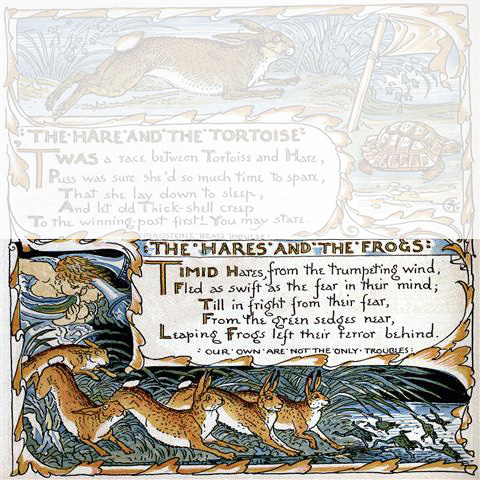
Timid Hares, from the trumpeting wind,
Fled as swift as the fear in their mind;
Till in fright from their fear,
From the green sedges near,
Leaping Frogs left their terror behind.
Our own are not the only troubles.

Gherardo Image from 1480

Heinrich Steinhöwel (Of the Hares and the Frogs)

de La Fontaine (Le lièvre et les Grenouilles)
Un lièvre en son gîte songeoit,
(Car que faire en un gîte, à moins que l’on ne songe?)
Dans un profond ennui ce lièvre se plongeoit:
Cet animal est triste, et la crainte le ronge.
Les gens de naturel peureux
Sont, disoit-il, bien malheureux!
Ils ne sauroient manger morceau qui leur profite:
Jamais un plaisir pur; toujours assauts divers.
Voilà comme je vis: cette crainte maudite
M’empêche de dormir, sinon les yeux ouverts.
Corrigez-vous, dira quelque sage cervelle.
Eh! la peur se corrige-t-elle?
Je crois même qu’en bonne foi
Les hommes ont peur comme moi.
Ainsi raisonnoit notre lièvre,
Et cependant faisoit le guet.
Il étoit douteux, inquiet:
Un souffle, une ombre, un rien, tout lui donnoit la fièvre.
Le mélancolique animal,
En rêvant à cette matière,
Entend un léger bruit: ce lui fut un signal
Pour s’enfuir devers sa tanière.
Il s’en alla passer sur le bord d’un étang.
Grenouilles aussitôt de sauter dans les ondes;
Grenouilles de rentrer en leurs grottes profondes.
Oh! dit-il, j en fais faire autant
Qu’on m’en fait faire! Ma présence
Effraie aussi les gens! je mets l’alarme au camp!
Et d’où me vient cette vaillance?
Comment! des animaux qui tremblent devant moi!
Je suis donc un foudre de guerre!
Il n’est, je le vois bien, si poltron sur la terre
Qui ne puisse trouver un plus poltron que soi.

Lepores et Ranae
Olim lepus quidam socios in hunc modum allocutus est: “Vita nostra miserrima est, assiduo enim metu terremur. Melius mihi videtur vitam finire.” Hoc audito, succlamant omnes se mori velle. Venerunt igitur ad lacum seque in aquam praecipitare parant. Vident autem subitum aquarum tumultum; ranae enim, leporum adventu territae, in algas ruebant. Tum lepus quidam “Heu,” inquit, “et alios, ecce, vexat timor malorum. Feramus vitae incommoda ut ceteri; mala enim levat patientia.”
Perry #138
